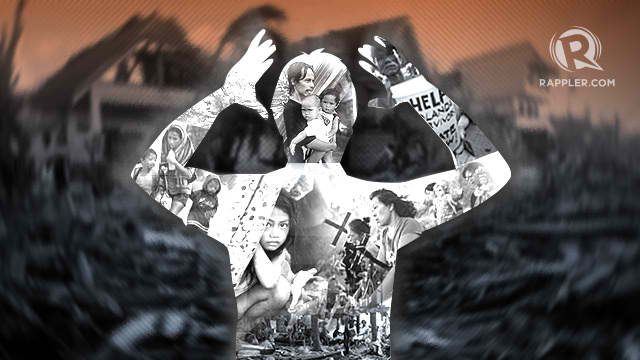SUMMARY
This is AI generated summarization, which may have errors. For context, always refer to the full article.

MANILA, Philippines — It happened 3 days after Valentine’s day. Big rocks fell over houses, leaving more than a thousand bodies dead and several children orphaned.
J. was one of the survivors of the 2006 Guinsaugon landslide in Southern Leyte. Both her parents went missing after the tragedy, leaving the teenager in the hands of her older siblings. But luck was never quite on J.’s side; she and her siblings had to live in separate towns to survive.
A year and a half later, J. wrote on her bedroom wall: “Kung ‘di lang kasalanan magkapamatay, ginawa ko na (If only it wasn’t a sin to commit suicide, I would’ve done it already).” On the kitchen wall, she wrote: “Walang nagmamahal sa akin (Nobody loves me).”
A few months later, through the help of mental health advocates, J. was diagnosed with clinical depression and received psychosocial support. Soon enough, she scrubbed her walls. (READ: How to spot suicidal tendencies among your loved ones)
J.’s is just among the many stories of resilience among the youth in times of crises, Lyra Verzosa of the Pambansang Samahan ng Sikolohiyang Pilipino shared on Wednesday, October 7, during a workshop on suicide and depression prevention organized by Childfam Philippines Co. and Possibilities Psychological Solutions.
How did the local community respond to J.? “Nothing was done, no intervention or referrals. Seen but no action,” Verzosa said. “I assume this is mostly the case for Filipino communities because people don’t understand what (being) suicidal is.”
“Depression is a common mental disorder, characterized by sadness, loss of interest or pleasure, feelings of guilt or low self-worth, disturbed sleep or appetite, feelings of tiredness, and poor concentration… At its most severe, depression can lead to suicide.” – World Health Organiation (WHO)
Verzosa suggested that care providers like teachers, barangay, health, and social workers need to be educated about depression. They must also know psychiatrists so they can make referrals as needed.
Meanwhile, another teenage survivor of the Guinsaugon landslide had a different story. The boy lost one of his parents and some of his siblings. During a therapy session, he was asked to draw something that symbolized himself. He drew a tree, explaining “maraming pagsubok pero heto ako nakatayo (there are many many challenges, but here I am standing).”
“Break our assumptions that if a child is undergoing a crisis, family problems, or depression, they’re going down, down, down,” Versoza said, stressing that resilience is dynamic. (READ: How mindfulness helps us cope with stressful jobs)
“Resilience doesn’t say that people who are tough do not fall down. A resilient person can also be sad. But they don’t retain that down position, they rise again,” she continued. Resilience is having the ability to cope with stress and the capacity to bounce back from traumatic events, Versoza explained.
She also clarified that there is no correlation between intelligence and resilience, emphasizing that resiliency does not mean invulnerability.
Aside from raising awareness on mental health issues, advocates like Versoza urge Filipino society to provide more psychiatrists nationwide, especially in places affected by calamities.
While depression may be caused by traumatic events, it may also result from a chemical imbalance in the brain, family history, medical side effects, or an illness. It may also occur for no apparent reason, explained Raymundo Faustino, head of Bulacan State University’s Wellness Center.
Support
According to Versoza’s study, J. is more of an exemption than a rule among the young survivors of the Guinsaugon landslide, “I found out that majority of the 200 orphans were optimistic.”
While not all schools have counselors, they may still develop simple programs that enhance students’ resilience, said Versoza:
- Get to know students and respect their individuality
- Affirm talents
- Integrate life skills in curricula and extra curricular practices
- Develop emotional intelligence (i.e., watching movies like Inside Out)
- Integrate service learning but mutually enriching (i.e., storytelling, science or math camps, volunteer programs)
- Remind them not to rush their development or healing process
- Do not treat children as mere victims or recipients; empower them
Contrary to what some Filipinos might think, depression is treatable. It can be long-lasting or recurrent, but it can be treated with talk therapy or medicine as needed.
Having a solid support system can also boost resilience, such as one’s family, friends, school, and community. The Philippines, however, does not have a national mental health law yet.
Verzosa praised the Philippine Science High School for having a “godparent system,” where more well-off parents provide financial or emotional support for less priviledged students.
Meanwhile, Faustino advised the youth to use their “character strengths” to prevent or recover from depression. (READ: I have depression and it feels good to admit it)
He advised those who are supporting loved ones with depression to do the following:
- Be emphatetic and understanding.
- Don’t try to “cheer up” a depressed person.
- Avoid critical or shaming statements.
- Challenge expressions of hopelessness.
- Empathize with feelings of sadness, grief, anger, and frustration.
“Instead of always asking what’s wrong with you, find the good in you,” Faustino said, adding that people should also try to see the good in others.
In November 2015, the people of Visayas will commemorate the second anniversary of Typhoon Yolanda (Haiyan). WHO estimated over 800,000 people in Yolanda-affected areas have experienced various mental health conditions, with 80,000 requiring medication and support.
Some of them may have already recovered from the tragedy, while others are still fighting their own battles. And there is nothing wrong with that, advocates say. Super humans do not exist after all. – Rappler.com
To learn more about psychological resilience, visit ChildFam Philippines Co. or Possibilities Psychological Solutions.
For free and confidential crisis support and intervention, call the Natasha Goulbourn Foundation’s Hopeline at (632) 804-4673 and 09175584673; the Light of Jesus Counseling Center (632) 7266728, (632)7259999, and 09228407031, or the In Touch Community’s Crisis Line at 893-7603, 0917 800 1123, and 0922 893 8944 (Sun).
For intervention programs and services, call the Philippine Mental Health Association at (632) 9214958 or visit a psychologist or a psychiatrist in a hospital near you.
Add a comment
How does this make you feel?










There are no comments yet. Add your comment to start the conversation.